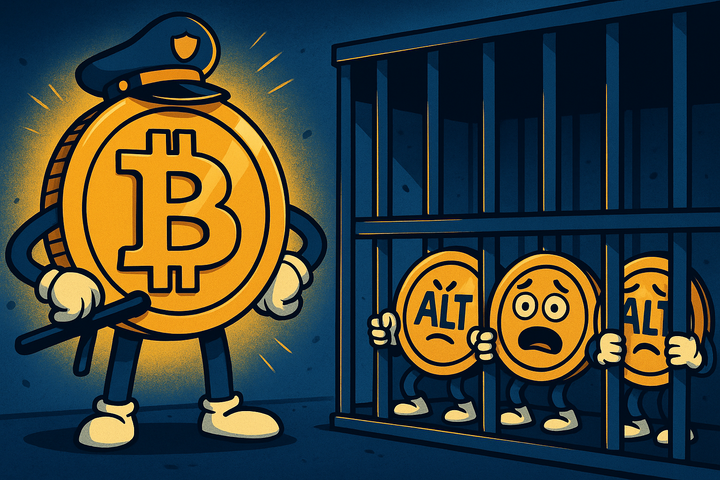Mastering Market Psychology and Derivatives: Key Lessons from a Bitcoin Trading Expert
In the September 11, 2024 episode of the Rough Consensus podcast, James Check interviews his market mentor, Doc Severson, about market psychology, trading strategies, and the current Bitcoin market dynamics.

Briefing Notes
My 'briefing notes' summarize the content of podcast episodes; they do not reflect my own views. If you have comments about this briefing note, please leave a comment below (requires signing up for a free blog subscription). Note that some of the podcasts I summarize are likely sponsored episodes: don't trust, verify, if the information you are looking for is to be used for decision-making.
Summary
This briefing note distills insights from the September 11, 2024 Rough Consensus podcast. James Check talks with Doc Severson, a seasoned trading mentor, on the critical aspects of market psychology, trading strategies, and the expanding role of derivatives in Bitcoin markets. Key themes include the dangers of herd behavior, the necessity of disciplined risk management, and the evolving influence of futures and options on market dynamics.
Take-Home Messages
- Understanding Herd Behavior: The crowd is often wrong; adopting a contrarian mindset can provide a trading edge.
- Importance of Risk Management: Establish clear exit strategies and adhere to strict risk management rules to mitigate losses.
- Derivatives Impact: The growing influence of futures and options is reshaping Bitcoin markets, requiring careful strategy adjustments.
- Simplify Trading Approaches: Focus on direct price action analysis rather than complex technical indicators that may cloud decision-making.
- Prepare for Market Volatility: Anticipate and leverage periods of high volatility by understanding range expansions and contractions.
Overview
The podcast episode features Doc Severson, who shares his extensive experience in market psychology and trading strategies with host James Check. Doc emphasizes that understanding herd behavior is crucial for traders, as market participants often make irrational decisions driven by fear and greed. By taking a contrarian approach and recognizing when the crowd is likely to be wrong, traders can better position themselves to capitalize on market movements.
Doc underscores the importance of disciplined risk management in trading, noting that many traders fail due to a lack of predefined exit strategies and poor adherence to risk limits. He recommends setting clear rules before entering trades, which can significantly reduce the likelihood of substantial losses. By focusing on these fundamental aspects of trading, Doc argues that traders can improve their overall performance and navigate the complexities of Bitcoin markets more effectively.
A significant portion of the discussion revolves around the impact of derivatives, such as futures and options, on Bitcoin markets. Doc explains how these instruments can introduce new dynamics, including increased price volatility and potential manipulation. As the market for Bitcoin derivatives expands, understanding their influence becomes essential for both retail and institutional traders. The conversation also touches on the need for regulatory oversight to mitigate the risks associated with these financial products.
Doc also highlights the cyclical nature of markets, characterized by phases of range expansion and contraction. Recognizing these patterns can help traders anticipate breakouts and make informed trading decisions. He advises traders to simplify their approach by focusing on direct price action, rather than relying heavily on technical indicators, which can often lead to confusion and misinterpretation of market signals.
Stakeholder Perspectives
- Retail Traders: Prone to herd behavior, retail traders can benefit from adopting contrarian strategies and emphasizing risk management to improve trading outcomes.
- Institutional Investors: As key players in the evolving Bitcoin market, institutional investors need to navigate the complexities of derivatives and market manipulation risks carefully.
- Regulators: With the increasing influence of derivatives, regulators face the challenge of implementing measures to protect market integrity and participants.
- Bitcoin Enthusiasts and HODLers: Understanding the broader market dynamics and psychological drivers can reinforce the long-term investment thesis in Bitcoin.
Implications
The podcast emphasizes that the psychology of trading is as important as the technical aspects. Herd behavior often leads to irrational decisions, making it essential for traders to cultivate a contrarian mindset. This insight has broader implications for market dynamics, where psychological factors frequently drive price movements rather than underlying fundamentals. For investors and market participants, understanding these behavioral patterns can be a significant advantage.
The impact of derivatives, such as futures and options, on Bitcoin market dynamics is another critical area of focus. As these financial instruments gain prominence, their role in influencing price stability and potential market manipulation will likely increase. For traders, this means a greater need for sophisticated strategies and a deeper understanding of the derivatives landscape. Regulatory oversight will also become increasingly important to maintain market integrity.
Finally, the importance of disciplined risk management and trading strategies cannot be overstated. As more people enter the Bitcoin market, the emphasis on having well-defined strategies, including setting clear exit points and adhering to risk limits, will be crucial. These insights highlight the need for ongoing education and adaptation to the fast-changing market environment, particularly as institutional participation grows and market structures continue to evolve.
Future Outlook
The Bitcoin market is expected to face both challenges and opportunities as it continues to mature. The growing influence of derivatives will likely play a significant role in shaping market dynamics, with implications for both volatility and liquidity. Traders and investors will need to adapt their strategies to account for the evolving landscape, particularly as institutional involvement increases and new financial products, such as Bitcoin ETFs, gain traction.
Psychological factors will remain a key driver of market behavior, underscoring the importance of independent thinking and contrarian strategies. For stakeholders across the Bitcoin ecosystem, staying informed and prepared for these changes will be essential in navigating the future. The broader implications of these trends suggest that while challenges such as increased volatility and potential market manipulation exist, there are also significant opportunities for those who can effectively anticipate and respond to market shifts.
Information Gaps
- How do futures and options markets influence Bitcoin price movements during periods of low liquidity? Understanding the influence of derivatives on Bitcoin price dynamics, particularly during periods of low liquidity, is crucial as these markets continue to grow. Insights from this research could guide strategies for managing volatility and identifying trading opportunities.
- What are the most effective risk management strategies for Bitcoin traders to minimize significant losses? Identifying and refining risk management strategies is essential for both new and experienced traders. Addressing this research need could lead to the development of best practices that enhance trading resilience in volatile markets.
- How are institutional trading practices shaping the evolving structure of the Bitcoin market? As institutional participation increases, their trading practices are having an important impact on market structures. This research would explore how these changes affect market behavior and what opportunities and challenges they present for all market participants.
- What psychological factors most commonly prevent traders from adopting contrarian strategies in Bitcoin trading? Exploring the psychological barriers to contrarian trading could provide valuable insights into improving decision-making processes. This research could help develop tools or educational resources that encourage traders to adopt more effective, independent strategies.
- How do macroeconomic factors like interest rates and inflation influence Bitcoin market dynamics? Investigating the relationship between Bitcoin and macroeconomic indicators like interest rates and inflation could help traders and investors better understand Bitcoin's role as a hedge or investment in varying economic conditions.
Broader Implications for Bitcoin
Market Maturity and Stability
Insights into herd behavior and trading psychology can foster the development of educational tools that promote disciplined trading among Bitcoin investors. This could gradually reduce irrational market actions, contributing to a more mature and stable Bitcoin ecosystem.
Legitimacy and Regulatory Needs
The growing role of derivatives could enhance Bitcoin’s legitimacy in traditional finance, making it more attractive to institutional investors. However, it also raises concerns about increased volatility and potential manipulation, necessitating stronger regulatory measures.
Influence on Decentralized Finance (DeFi)
The principles of disciplined trading and risk management discussed could inspire new DeFi platforms that empower users to make more informed decisions. This alignment with strategic thinking can drive innovation in DeFi, supporting broader Bitcoin adoption and usage.
Strategic Investment Culture
Focusing on contrarian strategies and disciplined approaches could encourage investors to view Bitcoin as a strategic, long-term asset rather than a speculative one. This shift may support Bitcoin’s role in wealth preservation and diversified investment portfolios.



Comments ()